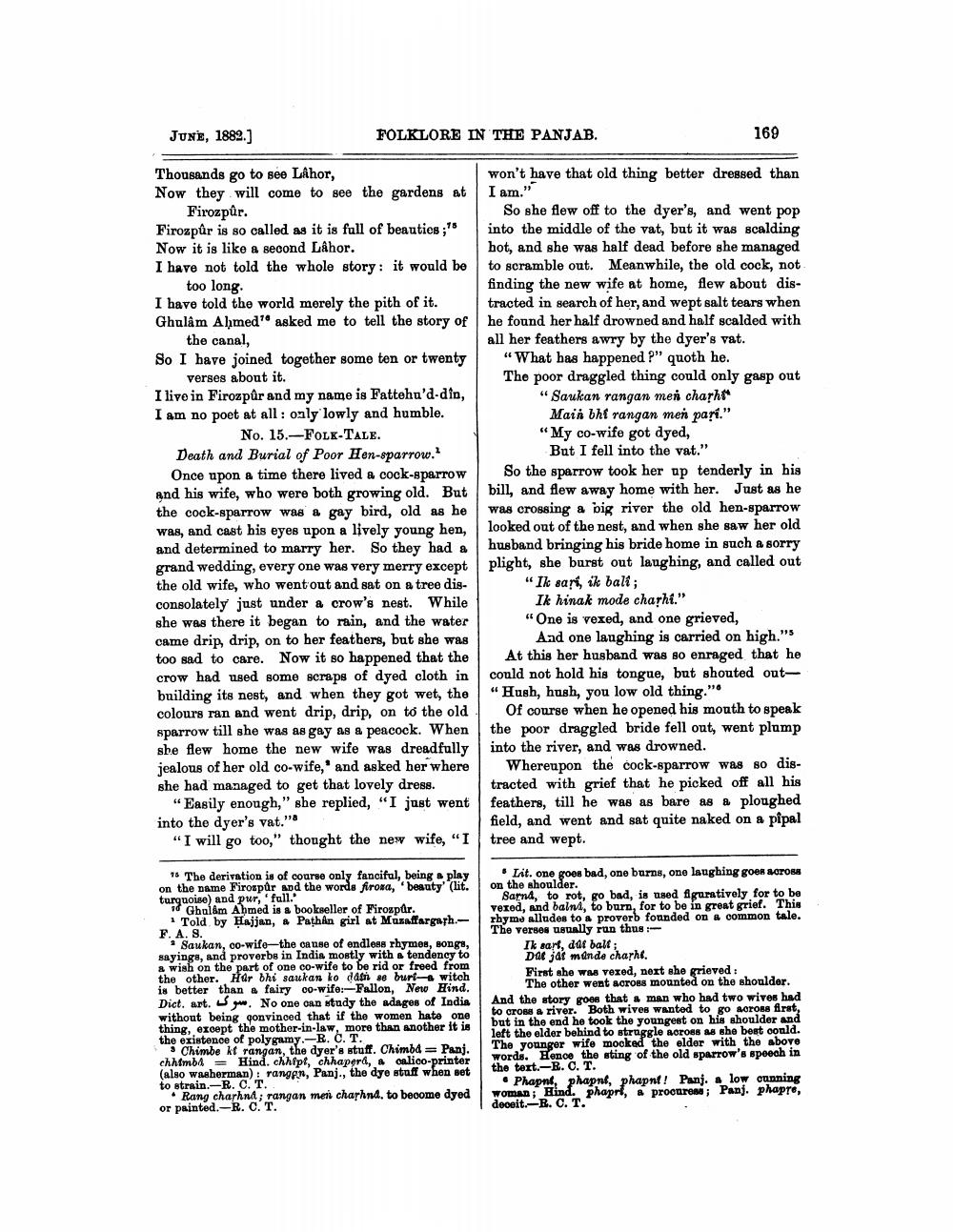________________
JUNE, 1882.)
FOLKLORE IN THE PANJAB.
169
Thousands go to see LAhor,
won't have that old thing better dressed than Now they will come to see the gardens at
I am." Firozpur.
So she flew off to the dyer's, and went pop Firozpur is so called as it is full of beauties;" into the middle of the vat, but it was scalding Now it is like a second Lahor.
hot, and she was half dead before she managed I have not told the whole story: it would be to scramble out. Meanwhile, the old cock, not too long.
finding the new wife at home, flew about disI have told the world merely the pith of it. tracted in search of her, and wept salt tears when Ghulam Ahmed" asked me to tell the story of he found her half drowned and half scalded with the canal,
all her feathers awry by the dyer's vat. So I have joined together some ten or twenty “What has happened P" quoth he. verses about it.
The poor draggled thing could only gasp out I live in Firozpûr and my name is Fattehu'd-din,
“Saukan rangan men chasht I am no poot at all: only lowly and humble.
Main bhi rangan men pari." No. 15.-FOLK-TALE.
“My co-wife got dyed, Death and Burial of Poor Hen-sparrow.
But I fell into the vat." Once upon a time there lived & cock-sparrow So the sparrow took her ap tenderly in his and his wife, who were both growing old. But bill, and flew away home with her. Just as he the cock-sparrow was a gay bird, old as he was crossing a big river the old hen-sparrow was, and cast his eyes upon a lively young hen, looked out of the nest, and when she saw her old and determined to marry her. So they had a husband bringing his bride home in such a sorry grand wedding, every one was very merry exceptplight, she burst out laughing, and called out the old wife, who went out and sat on a tree dis- "Ik sari, ik bali; consolately just under a crow's nest. While
Ik hinak mode chashi." she was there it began to rain, and the water "One is vexed, and one grieved, came drip drip, on to her feathers, but she was And one laughing is carried on high." too sad to care. Now it so happened that the At this her husband was so enraged that he crow had used some scraps of dyed cloth in could not hold his tongue, but shouted outbuilding its nest, and when they got wet, the “Hush, hush, you low old thing." colours ran and went drip, drip, on to the old. Of course when he opened his mouth to speak sparrow till she was as gay as a peacock. When the poor draggled bride fell out, went plump she flew home the new wife was dreadfully into the river, and was drowned. jealous of her old co-wife,' and asked her where Whereupon the cock-sparrow was so disshe had managed to get that lovely dress. tracted with grief that he picked off all his
"Easily enough," she replied, "I just went feathers, till he was as bare as a ploughed into the dyer's vat."
field, and went and sat quite naked on a pipal "I will go too," thought the new wife, “I tree and wept.
16 The derivation is of course only fanciful, being play on the name Firozpur and the words froxa, beauty (lit. turguoise) and pur, full. * Ghulam Ahmed is a bookseller of Firozpur.
Told by Hajjan, & Pathán girl at Mozaffargarh. F.A.S.
• Saukan, co-wife-the cause of endless rhymes, songs, sayings, and proverbs in Indis mostly with a tendency to & wish on the part of one co-wife to be rid or freed from the other. Har bhi saukan ko dan se burl witch is better than a fairy co-wife:-Fallon, New Hind. Dict. art. y. No one can study the adages of India without being convinced that if the women hate one thing, except the mother-in-law, more than another it is the existence of polygamy.-R.C.T.
Chimbe kt rangan, the dyer's stuff. Chimbd = Panj. chhimb Hind. chhfpt, chhapera, oalico-printer (also washerman) rangfn, Panj., the dye stuff when set to strain.-R. C. T.
Rang charhnd; rangan men chashna, to become dyed or painted.-R. C. T.
Lit. one goes bad, one burns, one laughing goes across on the shoulder.
Sarnd, to rot, go bad, is used figuratively for to be vered, and baind, to burn, for to be in great grief. This rhyme alludes to proverb founded on a common tale. The verses usually run thus:
Ik sart, ddf ball; De jaí munde chashi. First she was vexed, next she grieved:
The other went across mounted on the shoulder. And the story goes that a man who had two wives had to cross a river. Both wives wanted to go sorosa first, but in the end he took the youngest on his shoulder and left the elder behind to struggle across as she best could. The younger wife mocked the elder with the above words. Hence the sting of the old sparrow's speech in the text.-R.C.T.
• Phapnt, phapni, phapni! Panj. low cunning woman; Hind. phaprl, a procures; Panj. phapro, deceit.-R. C. T.




